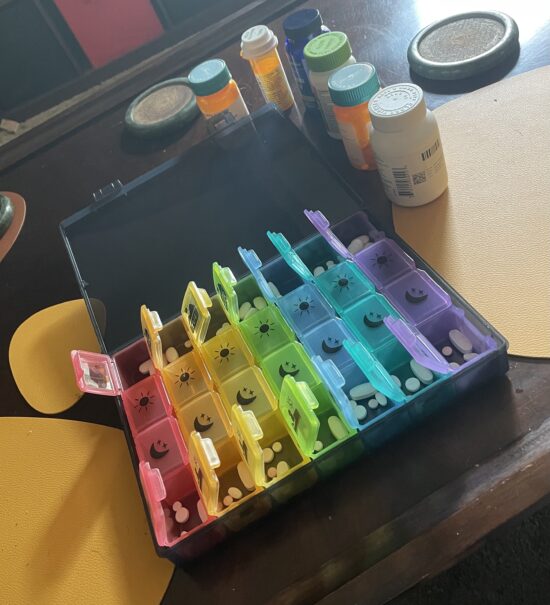After a peaceful stroll through the garden, and an appreciative look at the sun-facing side of the house, you have now walked inside. I recently discussed the overall philosophy of the architecture, but so far all you really know about this room is that it has floors, a fireplace, and a predictable assortment of furniture.
The trick with structures that live only in your head is that they are always changing. Without getting too specific, however (there will be no floor plan), I would like to share with you the room I have long imagined as the lungs of this home. (We will find the heart later.)
It is a large room, but the acoustics are surprisingly soft. In part this is because there are very few truly flat surfaces. The walls curve gently; their corners are rounded, suggesting they were carved, rather than constructed. The base colors are earth tones, reflecting that the walls are literally constructed from earth, but everywhere are bright splashes of color.
A staircase sweeps up one curved wall, its treads richly-stained hardwood, the bannister held by a lattice of cast iron, perhaps created by the same artist who made the gate that was your first introduction to this place. You can check for the artist’s mark on their work if you want to be sure.
There is a small door that leads to the space under the stairs. It matches the stair treads. Under-stair spaces have always been a little bit magical and mysterious to me (I grew up in a home without one), so I want to turn these spaces into hidey-holes, comfortable enough for a visiting grand-nephew to roll out a sleeping bag. Every under-stairs space should have at least one secret compartment, trap door, or other hidden surprise. Lights that respond to secret gestures, things like that.
“Secrets” are a feature in this home, even if everyone knows them. (Or do they? The possibility that there might be more secrets is pretty intoxicating. I will encourage the people who make this home to put in secrets not even I know about.) The secrets are the source of legends, stories that are passed through generations, gaining momentum with each retelling.
You have already met the fireplace and the cozy furniture that circles it. Behind the sofa there is a large table, magnificent and wood. It feels like it was made exactly for this place (it was – the craftsperson left their mark), and affords plenty of space for a great feast or a Warhammer game, or whatever tabletop games the kids are playing now.
Perhaps beneath the table the tile of the sun-warmed section of the floor has given way to wood as well, durable hardwoods that will last for a century (with a little care), but already the floorboards creak a little under your tread. Pure artifice, but the kind I enjoy; a reminder of the rustic foundations of Southwestern architecture.
And in every Southwestern home, you must look at the ceiling. Exposed beams, as round as they were when they were trees, cross the ceiling, supporting a lattice of wooden slats above. This is the most simple and iconic ceiling style, in other rooms you will discover the many, many variations on this simple theme that are possible. Here, the dark wood of the ceiling gives the room a cozier feel, more intimate despite the room’s size.
Over the table is a chandelier – perhaps also wrought iron, perhaps not (we will save the inevitable deer antler chandelier for another space). It creates a brighter pool of light even when the subtler lighting for the rest of the room is dimmed.
There is music here, as well. There is a sound system that does what all good sound systems do, but without being gaudy about it. Speakers are discrete but effective, and can get plenty loud when the need arises. The vinyl collection will probably live in a different room, closer to the heart.
Sound, but… huh. No television. There will be places for watching TV in this house, but this is not one of them. And when you really start looking hard, you will also see there is no plastic. That tells you two things: this room is built to last, and this room is a fantasy. But ultimately the goal is to employ no material that won’t still be viable 100 years from now (solar panels grudgingly excepted).
Of course with a big banquet table there must be a kitchen nearby! On the far side of the room from the curved glass wall is a curved adobe wall with a bar that communicates with the kitchen just beyond. The “main kitchen,” we will call it. (You have already seen the outdoor kitchen.)
While I will leave the details of the kitchen to the architects, from the common room you can get some of its vibe: Windows letting in northern light, stone countertops, and hand-carved doors on cabinets specifically crafted to follow the easy contours of the walls. Modern appliances, island, breakfast nook, and all that. A bright and comfortable place that still feels hand-crafted.
The curved south face of the house is also one of the walls for the “hallways” that extend to either side of the common room. On pleasant summer nights there is no wall at all, and the bedrooms open directly into the garden. Doesn’t that sound nice?
Perhaps later we will explore a bedroom or two, but “nice chambers, fireplaces maybe, quiet as only foot-plus-thick walls can grant, beautiful and varied ceilings, breezes” sums them up pretty well. For bathrooms, “hand-made tile, good light, elegant fixtures built to last, easy to clean” is the bullet list. The water reclamation system is actually more interesting than the water closets.
But around behind the stairs going up, you find two things: elevator doors, and stairs going down. I am very excited to tell you about both of those things.






